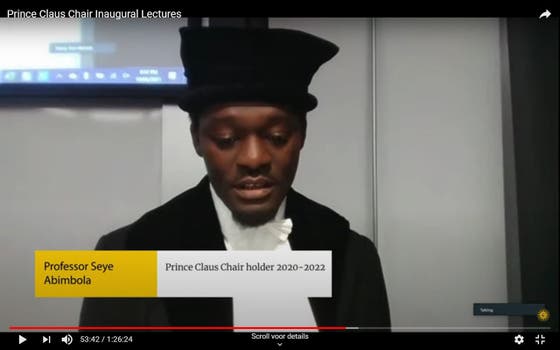Inaugural lecture by Seye Abimbola about health inequality

Why are people in certain countries healthier than others, and is there a correlation with how the health care system is organized? As holder of the Prince Claus Chair, Seye Abimbola, Professor of Global Health Research, researches what is needed to improve health equity in the world. On June 10 he held his inaugural lecture “Justice in Global Health Research” in the presence of Queen Máxima, patroness of this Chair.
“To improve global health equity, we need to look at justice,” says Seye Abimbola in his inaugural lecture, which he delivered a year after his appointment to the Prince Claus Chair “Justice in Global Health Research“ at Utrecht University. In this Chair at the department of epidemiology, global health of the Julius center, he studies health innovations in global epidemics such as the COVID-19 pandemic. Which ones work and which ones do not? And how is this related to how certain countries view their own healthcare systems?
Health system management
Seye’s premise is that no matter where a person lives, people should have the same opportunities for treatment and recovery. He refers to factors that have historically led to health inequality, such as colonization, discrimination, systematic inequalities, and power imbalances. In his inaugural lecture, he argues for the management of health systems to improve health care worldwide. Topical in the current corona pandemic, which has also influenced Seye’s work as the holder of the Chair. “The pandemic forced me to stay in Australia and do more online. This allowed me to give several online lectures to many students in the Netherlands, which I would otherwise not have been able to do. I have also been able to meet many more researchers with different interests online and this has already led to a number of grant applications from colleagues in the Netherlands. Still, I would love to see the people I work with here in real life. On screen you get to know someone a little bit, but seeing someone in real life completes the picture.”
Building the proper knowledge infrastructures
For the next sixteen months of his Chair tenure, Seye will build on the foundations that have been laid. “I feel this is really the right time in the work we do. We are going to rephrase some current academic global health practices in terms of injustice, but also in terms of: ‘what can we do and what can I do as a person?’ For me, that means continuing to focus on the management of innovations in health systems and the injustice of knowledge systems in global health. The focus will also be on doing, on how we build the proper knowledge infrastructures.”
Uncovering unseen knowledge
“I have realized that my work as holder of the Prince Claus Chair has broadened my focus. I now think much more in terms of justice and injustice. I used to think more in terms of equality. Adding the concept of justice to this has enriched my understanding of both. To me, it applies not only to what our research is trying to achieve, but there is an intrinsic unfairness in the system of research itself. I call this the injustice of knowledge that is unseen, unused and unappreciated. I want to bring this injustice to light.”
Watch Seye Abimbola’s inaugural lecture here.
About the Prince Claus Chair
The online event was attended by Queen Máxima as patron of the Prince Claus Chair for Equity and Development (PCC), which was established in 2003 by the ISS and Utrecht University. The Chair is designed to advance the careers of outstanding young scientists from developing countries and to stimulate knowledge sharing. With this Chair the universities want to promote research and education in the field of “equity and development” in accordance with the insights and ideas of Prince Claus.
